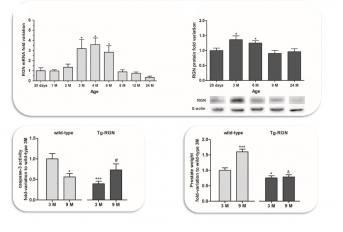Associação Portuguesa de Investigação em Cancro
Regucalcin may prevent the development of prostate age-related pathologies by modulating oxidative stress, cell proliferation and apoptosis
Regucalcin may prevent the development of prostate age-related pathologies by modulating oxidative stress, cell proliferation and apoptosis

Researchers from the Health Sciences Research Centre of the University of Beira Interior (CICS-UBI) previously established the role of Regucalcin (RGN) in the control of cell survival and proliferation in prostate, and demonstrated that RGN is a protein underexpressed in prostate cancer cases. Now these researchers evaluated the effect of RGN on aging, a well-known risk factor for the development of prostate cancer. Making use of knock-in animals for RGN, the impact of RGN overexpression in cell aging was determined in what concerns cell proliferation, apoptosis and oxidative stress. This study, recently published in the “Translational Research: The Journal of Laboratory and Clinical Medicine”, demonstrated that the expression of RGN is markedly downregulated in the prostate of aged animals. Curiously, the augmented levels of RGN in rat prostate improved the antioxidant defenses, and prevented the age-induced resistance to apoptosis and the excessive proliferation in the prostate of aged animals, features that are commonly found in cases of prostate cancer. The obtained results suggest that the manipulation of RGN levels may be a good strategy for the prevention or treatment of aged-associated diseases of prostate, as is the case of prostate cancer.
Authors and Affiliations:
Cátia V. Vaz, Ricardo Marques, Cláudio J. Maia and Sílvia Socorro
CICS-UBI, Health Sciences Research Centre, University of Beira Interior, Covilhã, Portugal
Abstract:
Regucalcin (RGN) is a calcium (Ca2+)-binding protein that displays a characteristic downregulated expression with aging in several tissues. Besides its role in regulating intracellular Ca2+ homeostasis, RGN has been associated with the control of oxidative stress, cell proliferation, and apoptosis. Thus, the diminished expression of RGN with aging may contribute to the age-associated deterioration of cell function. In the present study, we hypothesized that the maintenance of high expression levels of RGN may prevent age-related alterations in the processes mentioned previously. First, we confirmed that RGN expression is significantly diminished in the prostate of 8-, 9-, 12-, and 24-months wild-type rats. Then, the effect of aging on lipid peroxidation, antioxidant defenses, cell proliferation, and apoptosis in the prostate of wild-type controls and transgenic rats overexpressing RGN (Tg-RGN) was investigated. The activity of glutathione and the antioxidant capacity were increased in Tg-RGN rats in response to the age-associated increase in thiobarbituric acid reactive substances levels, an effect not seen in wild type. Overexpression of RGN also counteracted the effect of aging increasing prostate cell proliferation. In contrast to wild-type animals, the prostate weight of Tg-RGN did not change with aging and was underpinned by the diminished expression of stem cell factor and c-kit, and increased expression of p53. In addition, aged Tg-RGN animals displayed increased expression (activity) of apoptosis regulators, therefore not showing the age-induced resistance to apoptosis observed in wild type. Altogether, these findings indicate the protective role of RGN against the development of age-related pathologies, such as, for example, prostate cancer.
Journal: Translational Research: The Journal of Laboratory and Clinical Medicine
Link: http://www.sciencedirect.com/science/article/pii/S1931524415002959






